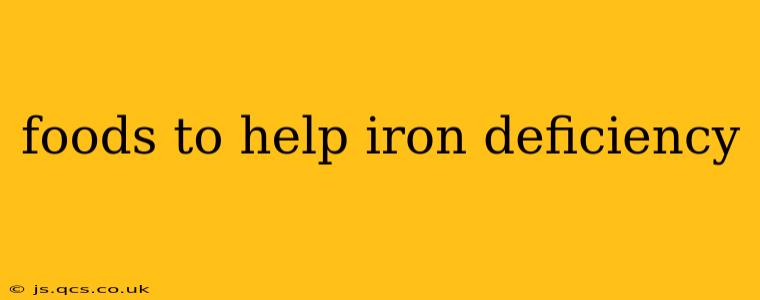Iron deficiency is a common nutritional deficiency, affecting millions worldwide. It occurs when your body doesn't have enough iron to produce hemoglobin, a protein in red blood cells that carries oxygen throughout your body. While mild deficiency might go unnoticed, severe iron deficiency, known as anemia, can lead to fatigue, weakness, headaches, and other serious health problems. Fortunately, dietary changes can significantly improve iron levels. This guide explores the best foods to combat iron deficiency and answers frequently asked questions.
What are the best foods to eat to increase iron levels?
The key to combating iron deficiency is consuming foods rich in iron, categorized into heme and non-heme iron. Heme iron, found in animal products, is more readily absorbed by the body than non-heme iron, found in plant-based sources. Therefore, a balanced approach incorporating both is crucial.
Excellent Sources of Heme Iron:
- Red Meat: Beef, lamb, and pork are excellent sources of readily absorbable heme iron. Lean cuts are preferred to minimize saturated fat intake.
- Poultry: Chicken and turkey, especially dark meat, contain a good amount of heme iron.
- Seafood: Shellfish like oysters and clams are exceptionally high in iron, while other fish like tuna and salmon also contribute.
Excellent Sources of Non-Heme Iron:
- Legumes: Lentils, chickpeas, kidney beans, and black beans are nutritional powerhouses packed with iron and other essential nutrients.
- Spinach and other Leafy Greens: Spinach, kale, collard greens, and other dark leafy greens are rich in iron, though absorption is enhanced when consumed with Vitamin C-rich foods.
- Fortified Foods: Many cereals, breads, and other processed foods are fortified with iron to increase their nutritional value. Check the nutrition labels for iron content.
- Dried Fruits: Raisins, apricots, and prunes are excellent sources of iron and other minerals.
- Nuts and Seeds: Pumpkin seeds, sunflower seeds, and almonds contain a decent amount of iron.
What foods help absorb iron better?
The absorption of non-heme iron can be significantly improved by consuming it alongside foods rich in Vitamin C. Vitamin C enhances the body's ability to absorb iron from plant-based sources. Pairing iron-rich foods with foods like:
- Citrus fruits: Oranges, grapefruits, lemons, and limes
- Strawberries
- Bell peppers
- Broccoli
How much iron do I need daily?
The recommended daily allowance (RDA) of iron varies based on age, sex, and overall health. It's best to consult a healthcare professional or registered dietitian to determine your individual iron requirements. They can assess your current iron levels and recommend a personalized dietary plan.
Can I get too much iron?
Yes, consuming excessive amounts of iron can be harmful. Too much iron can lead to iron overload, a condition that can damage organs like the liver and heart. It's crucial to obtain iron from a balanced diet and avoid excessive supplementation without consulting a doctor.
What are the symptoms of iron deficiency?
Symptoms of iron deficiency can range from mild to severe. Mild symptoms include fatigue, weakness, headaches, and shortness of breath. Severe iron deficiency (anemia) can lead to more serious complications, including pale skin, dizziness, chest pain, and irregular heartbeat. If you experience any of these symptoms, it is crucial to consult a doctor for proper diagnosis and treatment.
Are there any supplements to help with iron deficiency?
Iron supplements are available, but they should only be taken under the guidance of a healthcare professional. Self-treating with iron supplements can be risky, and it's essential to address the underlying cause of the deficiency. A doctor can determine if supplementation is necessary and recommend the appropriate dosage.
What are some cooking tips to maximize iron absorption?
Cooking methods can affect iron content. Avoid prolonged cooking times and high temperatures as they can reduce iron content. Using cast iron cookware can also increase iron intake during cooking, as some iron leaches into the food.
By incorporating these iron-rich foods into your diet and understanding how to maximize iron absorption, you can effectively combat iron deficiency and improve your overall health. Remember, consulting a healthcare professional is crucial for diagnosis and personalized treatment plans.
